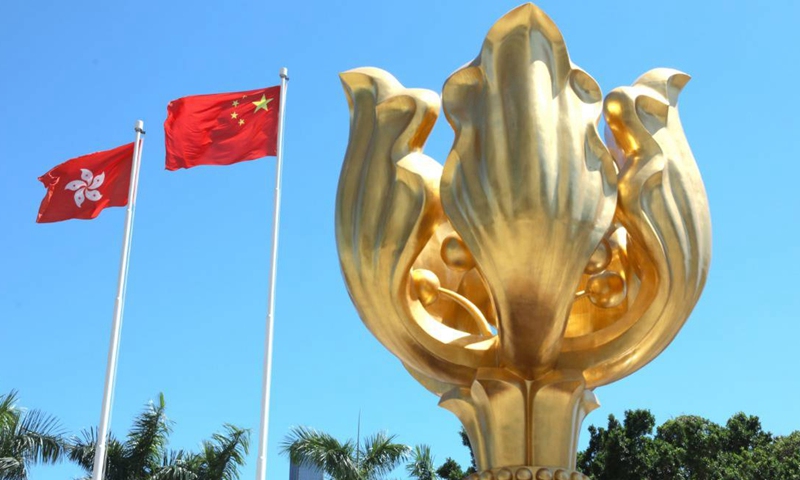
The Chinese national flag and the flag of the Hong Kong Special Administrative Region fly above the Golden Bauhinia Square in Hong Kong, China, Aug 5, 2019. Photo:Xinhua
National People's Congress (NPC) deputies from Taiwan said Hong Kong's national security legislation sheds light on the Taiwan question, sending a warning shot to Taiwan secessionists.
With the Hong Kong national security legislation as an example, the central government could further deepen, refine and even make related laws promoting reunification with the Anti-Secession Law as the basis, cracking down on "Taiwan independence" forces legally, said Cai Peihui, an NPC Taiwan deputy and a businessman from the island, according to a statement sent to the Global Times on Tuesday by the All-China Federation of Taiwan Compatriots.
This is a powerful warning to Tsai Ing-wen's authority that "Taiwan independence," just like "Hong Kong independence," is not welcomed by the Chinese people. The central government's determination in dealing with the separatists of Hong Kong and Taiwan is the same, he said.
"Taiwan independence is a dead end. National security is a sharp sword hanging over Taiwan separatists' heads," he said.
China's Anti-Secession Law was adopted in 2005, aiming to prevent Taiwan's secession from China.
The national security law would be an inspiration to peaceful reunification and the extension of "one country, two systems" principle, Zhang Xiong, a Taiwan deputy and a professor at Shanghai Tongji University, said, according to the statement.
"The process showed that legislation should be timely. If Article 23 of the Basic Law of the Hong Kong were established early, it could have awed hostile forces… Probably the fires, riots in black, 'Hong Kong independence' flags and collusion of forces would not have taken place in the city," Zhang said.
Tsai Pei-wei said that the riots in Hong Kong last year severely damaged the prosperity and stability, as well as the economic development, of Hong Kong. The violence weakened the Hong Kong government's administrative ability and international reputation. The central government making such a national law on administrating Hong Kong is supplementary to the Basic Law of Hong Kong, which would be the legal guarantee to deal with the riots and make sure the sovereignty of Hong Kong is unchanged.
Liao Haiying, an NPC Taiwan deputy and a doctor working in North China's Hebei Province, said that "The law also would inform the two sides across the Straits that the bottom line of national security could not be crossed."
The GDP of East China's Fujian Province reached 4.23 trillion yuan ($593 billion) in 2019, with a growth rate of 7.6 percent, surpassing the Taiwan island's 4.22 trillion yuan GDP for the first time. The two regions have similar cultures and dialects.

